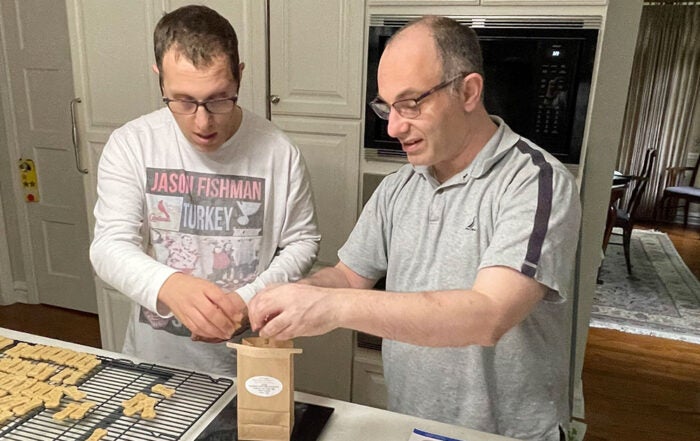Toilet training continues to be an important issue for families who have children with Fragile X syndrome (FXS). We have several articles on the topic of toilet training, which are mostly focused on introducing toilet training activities to younger children. It has been assumed that children of all ages would benefit from the same strategies, and if they were not initially successful with them, they may never make progress in toilet training.
Experience has shown these assumptions to be inaccurate. There is hope for older children (from about age 8 and up), but they require a different approach to toilet training. This article addresses the strategies found to be the most successful in this population.
Coming to Terms with the Past
It is important to recognize that your child is not “lazy” or “bad” for not being toilet trained. If they have never used the toilet consistently, there are reasons. Perhaps it’s an attention issue, or they have not been able to attend to physical sensations at the same time as intellectual activities. Perhaps they’re making negative associations with toilet training based on the past. Perhaps they had to sit too long without feeling successful. This approach is a “do over” for you and your child. It’s designed to be less stressful for all involved by teaching that trips to the bathroom can be pleasant and can occur regularly.
Before you begin to employ this do-over strategy, you should note any medical conditions in your child that may affect toileting behavior. Medication can affect bowels, as well as fluid consumption and appetite. By completing a log that we’ll detail below, you will better understand whether you should consult with your child’s doctor to address loose bowels, constipation, or both.
It’s also important to note your child’s fluid intake pattern. Whenever children drink a large quantity, they typically need to use the bathroom within about 15 to 30 minutes. Some children appear to be continuously wet. Review of intake patterns for these children often reveal a “grazing” pattern, in which they drink small amounts frequently throughout the day, rather than large amounts in a more condensed drinking pattern. The latter leads to more predictable elimination. If your child is habitually thirsty or can’t remain dry for at least 60 to 90 minutes at a time, make an appointment to discuss the matter with their doctor.
Emphasize a Schedule
Older children often develop maladaptive toileting patterns, including but not limited to dependency on diapers or pull-ups to cue elimination. This is particularly applicable to bowel training. Older children with FXS who are not toilet trained are often not bothered by wet or soiled clothing. They have practiced a pattern of eliminating in diapers or pull-ups for many years, and this pattern can be hard to disrupt. They, and perhaps more importantly, their parents, have often become discouraged, based on lack of progress with traditional approaches, and thus settle into a routine that does not include regular trips to the bathroom.
There is no need to accept this status quo. Older children can benefit from an approach that takes these patterns into consideration and turns them around. It begins by embedding a routine of “practicing” using the bathroom, before there’s any emphasis on successful elimination. During the practice, the child is exposed to every step in the toileting sequence, without specific pressure to perform. This desensitizes the child to use of the bathroom and decreases performance anxiety. It also teaches compliance and allows an opportunity for praise. Families choose a practice time that has a natural flow for family life, perhaps first thing in the morning or right before a bath.
Previous articles have outlined pre-readiness skills such as being able to:
- Perceive wetness.
- Communicate the need to use the bathroom.
- Recognize a full bladder.
- Get to the bathroom and sit on the toilet independently.
- Pull pants up/down and sit in the same spot for several minutes.
Waiting for these skills to emerge for older children does not appear practical or necessary.
Toileting Log
Before embarking on toilet training, you’ll need to keep a log for at least one week, and two weeks is better. This will show you the pattern and frequency of your child’s urination and defecation. It also establishes how long they’re able to “hold” urine before needing to void.
For older children, the emphasis should be on scheduled visits to the bathroom rather than insisting on their independence and initiation. As a parent, rather than waiting patiently for your child to initiate the process, you instead get them to respond to a cue. This behavioral approach will, however, require you to do some data collection to promote success.
Collecting the Data
Your log should include:
- Whether they’re wet or dry next to each hour interval. Note W for wet, and leave blank for dry.
- Time of each urination or defecation (and whether it’s in a diaper or a toilet).
- Time of each meal, snack, or drink.
As you check your child for wet/dry, this begins to reinforce success in avoiding elimination in the diaper — “Good, you’re dry.” At this point, however, there should be no negative message for a soiled or wet diaper. Rather, simply note, “Oh, you’re wet/ soiled; let’s change your diaper.”
Ten Steps to Success
1. Prep for success
Make sure the bathroom is accessible and that the child is able to place their feet flat on the floor while on the toilet.
Everyone should be comfortable and hopefully without anxiety. Anxiety or sensory sensitivities to smell, sounds, or touch may affect a child’s ability to participate in this process. First, determine which if any of these factors may be causing an issue. Behavioral approaches for desensitization to fears of the bathroom can help in this regard.
2. Stock the bathroom
Stock the bathroom with special toys and books that will live only in the bathroom. A shelf of toys and treats that can be seen, but not accessed unless a child is on the potty, is very powerful and helps maintain motivation for sitting.
3. Dress them in easy-on, easy-off clothing
Sweats, leggings, or shorts help make toileting fast and easy, underwear is not necessary to experience the feeling of wetness. It’s a good idea to use pull-ups as their convenience will allow you to remain more patient with this process. And try to decrease (or eliminate) any pressure to perform. Anxiety hinders success.
4. Create a picture schedule
A potty book social story that includes pictures of various toilets and the toileting sequence can help a child learn and become more comfortable with the sequence of necessary skills. You can help them practice parts of the sequence with a doll or stuffed animal.
Watching videos can also be helpful. It may also be useful to practice sitting on the toilet (seat down, clothes on) so that the child is gradually introduced to the toilet in a way that feels safe.
5. Encourage success
By prompting your child to visit the toilet when your log shows it’s a likely time for success, you’ll create another chance to praise them.
6. Time each event
Encourage the child to sit on the toilet for two to five minutes. This is typically long enough to relax. If this seems too long, initially keep the trip shorter and then build in materials or activities over time that help extend their time on the toilet (if required).
If extending the time on the toilet causes frustration, it could be counterproductive. Get a feel for your child’s tolerance and limit the time spent on the toilet accordingly.
7. Reinforce!
If the child properly voids, provide specific reinforcement such as a treat, praise, or a special story time. Use whatever you feel will encourage compliance and motivation.
8. Keep track
Record your information on the toileting chart and document both successes and accidents.
9. Encourage regular bathroom trips
If the child has not eliminated in the toilet or pull-up, you may wish to encourage a trip again in 30 minutes (if they’re still dry).
10. Study the patterns
Continue to check for wet or dry once per hour, and record the information on the log. The data should begin to reveal your child’s particular pattern, which you’ll use for continued success.
In Conclusion
These specific strategies have been useful in teaching successful toileting skills to older children with FXS. For some children this schedule-based approach will generalize into a self-initiated pattern that no longer requires parental oversight or adherence to a specific schedule. For others, successful elimination will continue to require a scheduled routine. In either case, the important point is that a highly functional skill has been mastered, with countless benefits that will pay off greatly for your child and everyone involved in his or her care. It’s a skill worthy of celebration.
about

Marcia Braden, PhD, PC
Dr. Braden is a licensed psychologist with a clinical practice specializing in children and adolescents, and serves on the NFXF Scientific and Clinical Advisory Committee and the HillSprings Learning Center Advisory Committee. She is also a contributing author of Fragile X Syndrome; Diagnosis, Treatment, and Research, compiled and edited by Randi and Paul Hagerman, Children with Fragile X Syndrome: A Parent’s Guide, edited by Jayne Dixon Weber, and author of Fragile: Handle With Care: More About Fragile X Syndrome.
About

Jennifer Epstein
Dr. Epstein is a licensed clinical psychologist and health service provider with more than 20 years of experience working with children and families. Dr. Epstein specializes in treatment of neurodevelopmental disorders including delays in development, autism spectrum disorders, and genetic disorders such as Fragile x syndrome. She is a certified Early Start Denver Model Trainer.
learn more
Exploring Parents’ Concerns Regarding Long-Term Support and Living Arrangements for Their Children with Fragile X Syndrome
Given the limited data regarding future planning specific to individuals with Fragile X Syndrome (FXS) and the growing population of this community, this study sought to explore the concerns and challenges caregivers of individuals affected by FXS encounter when considering long-term support plans.
American Academy of Pediatrics Hosts New Course on Fragile X syndrome
AAP/CDC course, "Identification, Management, and Caring for Children and Adolescents with Fragile X Syndrome" will be available for pediatricians and other healthcare professionals through August 1, 2025, on the AAP PediaLink platform.
The Brothers Who Bake D&J Doggie Delights
Meet David and Jason who together bake and sell dog treats. But that's not their only job: David works as a stocker at a grocery store and paints and exhibits his work at a local gallery. Jason works as a dishwasher and cart attendant and loves to swim.
An Xtraordinary Employee: Corey Gershenson
Corey Gershenson lives with Fragile X syndrome. Thanks to his determination — and employers willing to embrace employees with disabilities — he also works two jobs and volunteers at Mercy Hospital in St. Louis.
It’s All About Employ-Ability!
Paula Fasciano and friends opened Bake Ability so they could give employment opportunities to individuals with intellectual and developmental disabilities.
An Xtraordinary Employee: Clay
A concern for parents of children with Fragile X syndrome is their level independence as an adult. This is Clay and his mother June's story.







